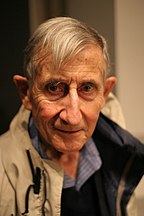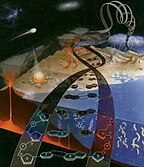Dear Avinash Sahay,
I've been talking a lot recently about the three core obstacles to our evolutionary progress.
This was the main focus of my recent online seminar, and I also emailed you a few days ago elaborating on one of them: the hardwiring of our evolutionary past.
Today I'm writing to share another key piece of the puzzle that I've seen trip up many people on a spiritual or personal growth path. And, more importantly, what we can do to move beyond it.
In my recent Activating the Impulse of Evolution seminar, I suggested something that I hope is an exciting prospect for many of you (it certainly is for me). I proposed that dramatic and radical change IS possible for human beings.
I explained how, with the right process and approach, we can clear even the most tenacious inner hurdles to become the human beings we want and need to be.
We can take that big of a leap.
I not only believe this. I've seen it. Profound, life-transforming spiritual liberation is accessible. It's not only possible in this lifetime, but is in fact well within reach for anyone of reasonably sound mind and stable character.
But there's an important ingredient needed to crack the old "code" so we can do it: motivation.
Once we've become aware of the most essential roadblocks to personal and cultural change, where do we get the motivation to move beyond them?
One of the crucial reasons that radical evolution beyond ego doesn't happen, even for earnest seekers, is this:
For most of us, the context for our spiritual path is just too small.
In a word, it's still about us--our own fulfillment, our own happiness, even our own enlightenment.
It's not that we're selfish people. Indeed, most spiritual seekers are among the most selfless people on the planet.
The problem is that we've all been steeped in a contemporary spiritual subculture that sees the entire purpose of following a spiritual path as personal. It tells us that the reason for working on spiritual growth is so that we can live happier, more fulfilled, more peaceful lives.
Our own comfort and contentment seems like a reasonable enough goal. But as long as our own happiness is all we're seeking, we'll never awaken the depth of spiritual passion and conviction required to propel us into genuine evolution beyond ego.
That impetus only arises powerfully enough when we realize that the spiritual path is not about us, but rather is about participating in something far greater than ourselves.
To get a taste of what I'm talking about, imagine for a moment that the fate of the entire human race rested on your shoulders alone. That humanity's evolution out of brute self-interest depended entirely on your willingness to transform your consciousness.
What if you knew that the human race could advance past its smallness and negative conditioning --if you only became an exemplar of humanity's highest potential for the world?
Imagine that for you, evolving beyond ego became an evolutionary imperative.
Would you approach your path any differently? Would the energy you brought to your spiritual practice intensify? Would the quality of awareness and care with which you approached your interactions with others become more profound?
Would you find yourself reaching with inner muscles you didn't even know you had to actually stay awake to the depth you've tasted in your most profound spiritual moments?
If you knew it all rested on you, would you have any choice but to change?
The Indian sage Ramana Maharshi once said that the spiritual aspirant must want liberation like a drowning person wants air.
Why? Because the challenges of authentic spiritual growth and transformation are so great that most of us will choose to continue suffering in our smallness, rather than feel the pain of allowing that smallness to die forever.
But how many of us would stay there if we realized that it wasn't only our own suffering we were perpetuating? What if our petty indulgences were perpetuating the suffering of the entire human race?
Now, you may be thinking to yourself, "That's a nice thought experiment. Sure, it makes me realize I could be more earnest on my path, but what does it really have to do with me? I'm no megalomaniac. I know that my growth and evolution alone isn't enough to liberate the human race."
And it's here that I would ask you to reconsider.
Modern science has in recent decades been verifying what the ancient traditions intuited long ago: that, in both tangible and mysterious ways, we are all interconnected. Any one of us can have a profound effect on the whole.
Add to that the reality that we are evolving beings living in an evolving universe. We are all part of a grand, cosmic evolutionary process. Then the question of our obligation to the whole starts to cut close to the bone.
To reframe my earlier question: What if you realized that the entire human endeavor, the evolution of consciousness itself, depended on your willingness to evolve your own consciousness?
How would it affect the choices you make every day if you knew that in a very real sense, those choices were either contributing to the evolution of the whole--or holding it back?
At this time when it seems that our very future depends on our willingness to evolve as a species, would you have any choice but to act in alignment with the greatest evolutionary good?
The point I'm trying to make is that when we take a closer look at what spiritual work and growth is actually for, it quickly becomes clear that the path of awakening is not primarily about freeing ourselves from suffering or securing our own happiness.
Sure, that's a nice by-product. But, as long as that's all we're seeking, we probably won't get very far.
Where the spiritual path really begins to get interesting is when we recognize that transforming ourselves in the deepest possible way is in fact an evolutionary imperative, with profound consequences far beyond ourselves.
If we begin to embrace the fact that our lives are not simply our own to do with as we please--that in everything we do, we are in fact accountable to the Whole--something truly miraculous begins to happen.
Faced with the palpable responsibility to evolve for a greater good, we find that we suddenly have access to a seemingly infinite source of energy, intention, passion and courage to confront whatever challenges present themselves on our path.
What's more, all of the personal issues and problems--all of the fears and doubts and resistances that once seemed so insurmountable--begin to seem a lot less significant.
Why? Because our attention is now captivated by something much bigger than ourselves.
This is the power of context. We see our individual concerns, the worries we fret over day to day, from a different vantage point. Held up against this larger picture and greater purpose, those concerns suddenly seem very small indeed.
Realizing "it's not all about me," and ignited by a noble calling to participate in the grand adventure of conscious evolution, we find we no longer even want to give those worries the time of day.
And in this freedom from self-concern, before long we discover that the deep inner peace and joy we were seeking all along has become the very ground we are walking on.
To get a taste of the liberating context I'm pointing to, try the following experiments:
1) Before you meditate or engage in any spiritual practice, take 10 minutes to reflect on the profound significance of your practice. Ask yourself:
-Why do I need to awaken for myself?
-Why do other people need me to awaken?
-Why does God/evolution/humanity (your choice) need me to awaken?
Allow yourself to feel deeply into the most authentic answer you can find. Then, invite that deeper answer to come forward as a clear and present intention to engage your spiritual practice wholeheartedly, as if the universe depended on it. And engage your practice from this deeper intention.
Notice how this exercise impacts the quality of your spiritual practice.
2) When you encounter a challenging and emotionally charged situation in your life, before you respond, take a few minutes to ask yourself:
-What is the most enlightened or evolved response I could have in this situation?
-Why is it important for my own evolution that I respond in the most enlightened, evolved way I can?
-Why does God/evolution/humanity (your choice) need me to respond in the most enlightened, evolved way I can?
Allow yourself to feel into the larger significance of your response to this challenging moment. Ground yourself in an intention to show up as an exemplar of humanity's potential. And then respond from this deeper intention.
Notice how this approach changes your perspective on the situation and your ability to meet it.
There is deep and powerful work that can be done to cultivate this perspective, to truly ground your life in this way of seeing--and even more importantly, acting.
If the possibility of participating in this adventure of conscious evolution inspires you, then I invite you to join me for a nine-week journey into an evolutionary relationship to life.
Our nine-week online course starts next Wednesday, April 10. In it, we'll engage a step-by-step process to awaken beyond our outdated, primitive "operating system" and learn how to live life as a liberated expression of the impulse of evolution.
You can learn more and register at the link below:
To our evolution,
Craig Hamilton
Founder
Integral Enlightenment
| 

 Email this page
Email this page Print
Print del.icio.us
del.icio.us StumbleUpon
StumbleUpon Facebook
Facebook















